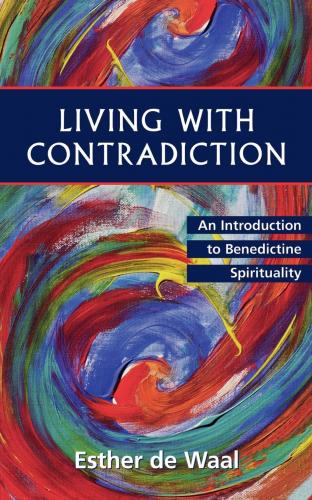LIVING WITH
CONTRADICTION
An Introductionto Benedictine Spirituality
Esther de Waal
Copyright © 1989, 1997 by Esther de Waal
All rights reserved. No part of this book may be reproduced, stored in a retrieval system, or transmitted in any form or by any means, electronic or mechanical, including photocopying, recording, or otherwise, without the written permission of the publisher.
Unless otherwise noted, the Scripture quotations contained herein are from the New Revised Standard Version Bible, copyright © 1989 by the Division of Christian Education of the National Council of Churches of Christ in the U.S.A. Used by permission. All rights reserved.
Morehouse Publishing, 4775 Linglestown Road, Harrisburg, PA 17112
Morehouse Publishing, 445 Fifth Avenue, New York, NY 10016
Morehouse Publishing is an imprint of Church Publishing Incorporated. www.churchpublishing.org
Library of Congress Cataloging-in-Publication Data
De Waal, Esther.
Living with Contradiction: an introduction to Benedictine spirituality / Esther de Waal.
p. cm.
Originally published: London: Fount Paperbacks, 1987, in series:
Rhythm of life.
Includes bibliographical references.
ISBN 978-0-8192-1754-7 (pbk.)
1. Benedict, Saint, Abbot of Monte Cassino. Regula. I. Title.
BX3004.Z5D35 1998.
255’.106—dc21 97-48801
CIP
Printed in the United States of America
Contents
III Living With the Contradictions
Preface
It is very fascinating to see how, in the ten years since this book was first written, increasing numbers of lay people like myself are turning to the monastic tradition. Here they find support on their Christian journey which they often fail to find in the institutional church, where parish and diocesan life can be extremely busy, and seemingly lacking in any sort of contemplative focus. ‘The church is getting a bad press – except for her monasteries.’ This comment, which I read recently in an American national newspaper, shows how widespread this feeling is. Debates on political issues, on fund-raising or administrative concerns seem to drown out the voice of prayer.
Why is it that 1500 years after it was first written, so many thousands of people today are reading the Rule of St Benedict? I believe that it is because this short sixth-century monastic text, coming as it does from St Benedict's own experience of life, can still bring support, inspiration and challenge. His Rule is simply a practical manual to give guidance to a family of brothers, an extended household, who had to earn their living, who were concerned with food, with the care of visitors or the sick, with the upkeep of buildings and land, while recognizing the need for time to read and study – and yet determined to make prayer the central focus, the one priority of their lives. St Benedict helped them to bring balance and rhythm into a life whose pressures and demands were remarkably similar to our own.
Balance and moderation are commonly regarded as the hallmarks of Benedictine spirituality. Yet it is vital, if we are to recognize the power and the influence of the Rule, not to see this as anything mediocre, lukewarm or middle of the road. There is nothing safe or easy in holding a central position between opposites. It asks me to be fully alive, constantly moving forward, even at those times when I am feeling as though I am only holding on precariously. The way of St Benedict is the way of the Gospel. As Christ came to make us fully alive, to open eyes and ears and hearts to the fullness of life that is on offer, so too is the Rule vibrant and infused with energy.
At the heart of the Gospel, as at the heart of Christ's own life, of course there is paradox. So living with the Rule of St Benedict means living with paradox, with contradiction. This is something for which I am profoundly grateful, and that gratitude increases as the years go on. Life does not add up: the longer I live the more that is brought home to me. It was not the message that I received from my parents or one that was taught to me by any educational establishment as I was growing up. Nevertheless I think, looking back, that this is probably one of the most useful lessons that one can hear. It is curiously liberating to realize that I shall go on until the day of my death trying to hold differing things together and that the task (for which I need all the help that I can get) must be to do it creatively, so that the tensions may become life-giving.
Today as I look around me I see a world in which there is not so much holding together as splitting apart. There is increasingly polarisation, whether in politics or in religion or in the divides within society itself. People seem to be building barricades to maintain their positions, unwilling to listen to other points of view, as they metaphorically (and sometimes actually) wave banners and shout slogans which make statements declaring the certainties to which they cling. It seems so adversarial, antagonistic.
How far this is from the stance of St Benedict, whose first, opening word of the Rule establishes the keynote of all that is to follow: Listen. Listen, he goes on to say, with intention, with love, with ‘the ear of the heart’ – that most lovely small phrase which suggests that we listen not cerebrally with the intellect, but with the whole of ourselves, our feelings, emotions and imagination. I am taken away from an inner monologue with myself that is very attractive and can all too easily become an egotistical and defensive exchange. But if I learn to listen then I
